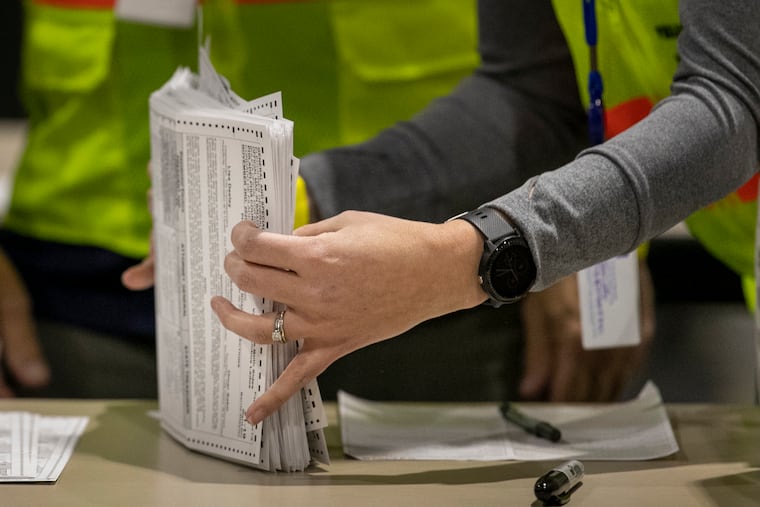Trump ups the ante in his Pa. court fight, asking a judge to upend the state’s Electoral College selection process
That request — laid out in a revised complaint submitted by Trump’s legal team — has only limited basis in the law and would effectively disregard the votes cast by 6.8 million Pennsylvanians.

Seeking to revise the case they laid out in court just a day earlier, President Donald Trump’s campaign lawyers asked a federal judge in a new filing Wednesday to consider a drastic new solution in their challenge to Pennsylvania’s election results: Declare the statewide vote “defective” and empower the state’s Republican-controlled legislature to appoint the state’s delegates to the Electoral College.
That remedy — laid out in a revised complaint submitted by Trump’s legal team — has only limited basis in the law and would effectively disregard the votes cast by 6.8 million Pennsylvanians.
It also seemed to run contrary to inclinations expressed by U.S. District Judge Matthew W. Brann during the Tuesday court hearing. Faced, then, with a Trump request to temporarily block the state from certifying its results, Brann balked.
“You’re asking this court to invalidate … votes, thereby disenfranchising every single voter in the commonwealth,” he said. “Can you tell me how this result could possibly be justified?”
The long-shot legal thinking behind the new, more drastic request has become increasingly popular in Republican circles as Trump’s chances of reversing former Vice President Joe Biden’s victory through court challenges have grown dimmer with each new lawsuit tossed by the courts.
The U.S. Constitution grants state legislatures the authority to determine the rules by which elections take place. And in Pennsylvania, it has left the appointment of Electoral College electors up to the governor, in this case Democrat Tom Wolf.
Wolf is bound by law to select the delegates based on the winner of the state’s popular vote once election results are certified. And as of Wednesday evening, Biden held an 82,000-vote lead.
But a 19th-century federal law known as the Electoral Count Act lays out a mechanism for putting state legislators back in control in the event of what it describes as a “failed election,” or one in which voters have not made a clear choice.
In its legal filing Wednesday, Trump’s campaign maintained that Pennsylvania’s election results fit that profile and argued that a series of policies enacted by Democrats had purposefully and illegally diluted GOP votes.
The new complaint steers into unsupported conspiracy theories laid out in court Tuesday by Trump lawyer Rudy Giuliani and accuses state and local leaders in Democrat-leaning counties of working in concert to steal the election through fraudulent mail-in votes.
It asserts, without evidence, that statistical analysis will prove that more than 70,000 Biden votes were improperly cast and counted “in a rush to count mail ballots to ensure Democrat Joe Biden was elected.”
But Brann may not even get as far as considering the campaign’s new request.
At this late stage in the case, he must approve any move to revise the legal complaint before him and he has not indicated that he is open to doing so, given the tight Nov. 23 deadline the state is under to certify its election results. The judge also appeared skeptical Tuesday on the merit of the campaign’s claims or whether they even have standing to bring their suit.
He canceled a hearing scheduled for Thursday for which Giuliani had pledged he was prepared to present evidence to back up his speculative theories.
“I don’t think there’s a need for a hearing at this juncture,” the judge said.
The new Trump campaign filing came the same day the Pennsylvania Supreme Court moved to intervene in an ongoing court fight over challenges the Trump campaign filed to more than 8,300 mail ballots in Philadelphia.
The court’s Democratic majority voted to exercise its “king’s bench” authority, which permits the justices to assume jurisdiction of a case at any stage of the legal proceedings.
The matter had been scheduled for a hearing Thursday before a lower appellate court that was set to decide whether the ballots should be thrown out for technical errors such as a voter forgetting to write the date or home address on the envelope.
The litigation mirrors similar cases Trump campaign lawyers and Republican allies have filed in other Pennsylvania counties including suits seeking to toss some 4,500 ballots in Montgomery, Allegheny, and Bucks Counties
» READ MORE: Trump’s campaign is challenging mail and provisional ballots at record rates in Philly and its suburbs
In its order Monday, the Supreme Court did not indicate how quickly it intends to hold potential hearings or issue a ruling in the Philadelphia case.
But its ultimate ruling is likely to govern how the rest of those cases play out.
The court’s two Republican justices dissented in the decision.